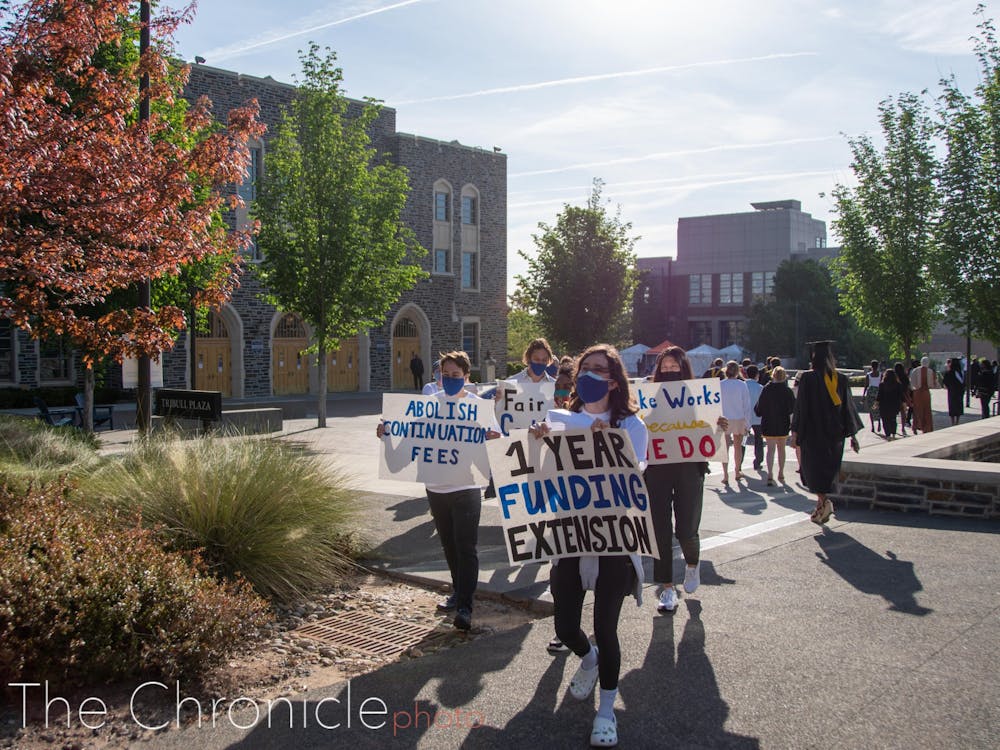The Duke Graduate Students Union held a rally Sunday morning to bring attention to a series of demands presented to the University.
The “Rally for a Secure Future” began in front of Wallace Wade Stadium shortly before Sunday’s undergraduate Commencement ceremony. During the rally, which was live streamed, graduate workers highlighted their demands for a universal one-year funding extension, the abolition of continuation fees and a fair contract between DGSU and the University.
Michael McGurk, a seventh-year Ph.D. candidate in English, began his remarks by congratulating the Class of 2021 and emphasizing the importance of graduate students to undergraduate education.
“We work with your students,” McGurk said. “We are their teachers, we assist in their labs, we provide research for them.”
Despite this, Duke is not providing the support graduate workers need, McGurk said. He described challenges graduate students face that hinder their ability to fulfill their responsibilities at the University, including travel restrictions and having to redesign courses to continue teaching.
McGurk called on the Graduate School to recognize the “extraordinary circumstances” graduate workers are operating under and recognize the union’s demands, which would make it possible for students to finish their work and help undergraduates.
“If Duke wants us to produce first-rate scholarship and teach first-rate classes, they cannot give us a second-rate wage and second-rate solutions to the pandemic,” McGurk said.
John Zhu, director of communications for the Graduate School, wrote that Duke and the Graduate School “have continuously worked to enhance graduate student support, and will keep doing so.”
“Even amid financial uncertainty caused by the pandemic, Duke invested more resources than ever to support Ph.D. students,” Zhu wrote.
Joe Hiller, a second-year Ph.D. candidate in cultural anthropology, emphasized the need for a one-year funding extension. The groundwork for dissertations in cultural anthropology are often built in the first and second years, he said, and for many this foundation was disrupted by the pandemic. Hiller was personally unable to travel in summer 2020 for research, which negatively impacted his work.
Hiller also mentioned the importance of a fair union contract in ensuring that “ad hoc” changes to University policy remained in place.
After Hiller spoke, the union members processed from Wallace Wade Stadium to Science Drive Garage, starting chants like “Hey, hey, ho, ho, continuation fees have got to go” and “Get up, get down, Durham is a union town.” They carried signs with the DGSU logo and phrases such as “Duke Works Because We Do” and “Seat at the Table.”
At the second location, Austin Wadle, a fourth-year Ph.D. candidate in civil and environmental engineering and co-chair of the DGSU, shared a story on behalf of Matthew Taft, a seventh-year Ph.D. candidate in English.
Taft, an international student from Australia, had to “pack up his life in 72 hours” and return home with his partner in 2020 when the University closed. Confusion about visa directives—particularly now-rescinded changes under the Trump administration—further complicated matters.
“A lack of access to research materials and libraries coupled with an almost complete absence of funding opportunities for those of us outside the US has not only slowed my progress but imposed a heavy psychological price,” Wadle read aloud from Taft’s statement. Taft also called for a one-year funding extension.
Wadle also shared their own experiences. When science labs closed from March to June it created setbacks in research projects, and even now they said there is a “deep sense of anxiety” each time they return to the lab.
Zhu wrote that Duke provided funding opportunities for any Ph.D. who needed it for summer 2020. He added that they also distributed millions in emergency financial support to graduate students using the Duke Student Assistance Fund and developed a process to provide funding extensions for Ph.D. students whose “progress toward a degree has been significantly disrupted.”
Zhu added that all Ph.D. students in their guaranteed funding period will receive 12 month stipends beginning in fall 2022.
“These efforts reflect Duke’s strong, ongoing commitment to graduate students,” Zhu wrote.
The rally concluded with Wadle leading the group in singing “Solidarity Forever” and someone dropping a banner with the DGSU logo on the exterior of Science Drive Garage.
The rally followed an April 23 event in which Duke Workers United—consisting of DGSU, the AFSCME Local 77, ATU Local 1328, Duke Faculty Union and Duke University Press Workers Union—discussed their working conditions and demands to the University.
DGSU has previously advocated for a fair contract with the University, including dental care, an updated harassment policy and the removal of continuation fees. The Graduate School already allows graduate students to apply for funding extensions, which would permit for the completion any activities that were hindered by the pandemic with financial support from the University. However, DGSU is now advocating for a universal extension, which would provide “security and stability” to all students rather than the present “means-tested” system.
Get The Chronicle straight to your inbox
Signup for our weekly newsletter. Cancel at any time.

Nadia Bey, Trinity '23, was managing editor for The Chronicle's 117th volume and digital strategy director for Volume 118.

